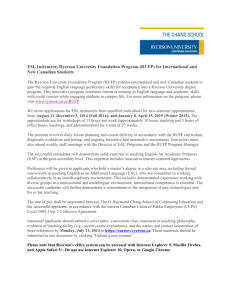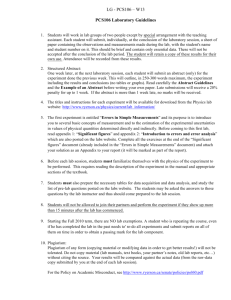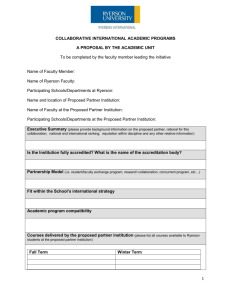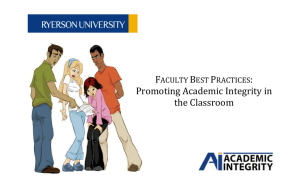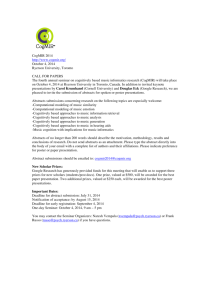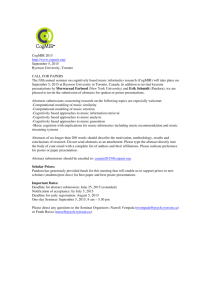Business of Music I
advertisement
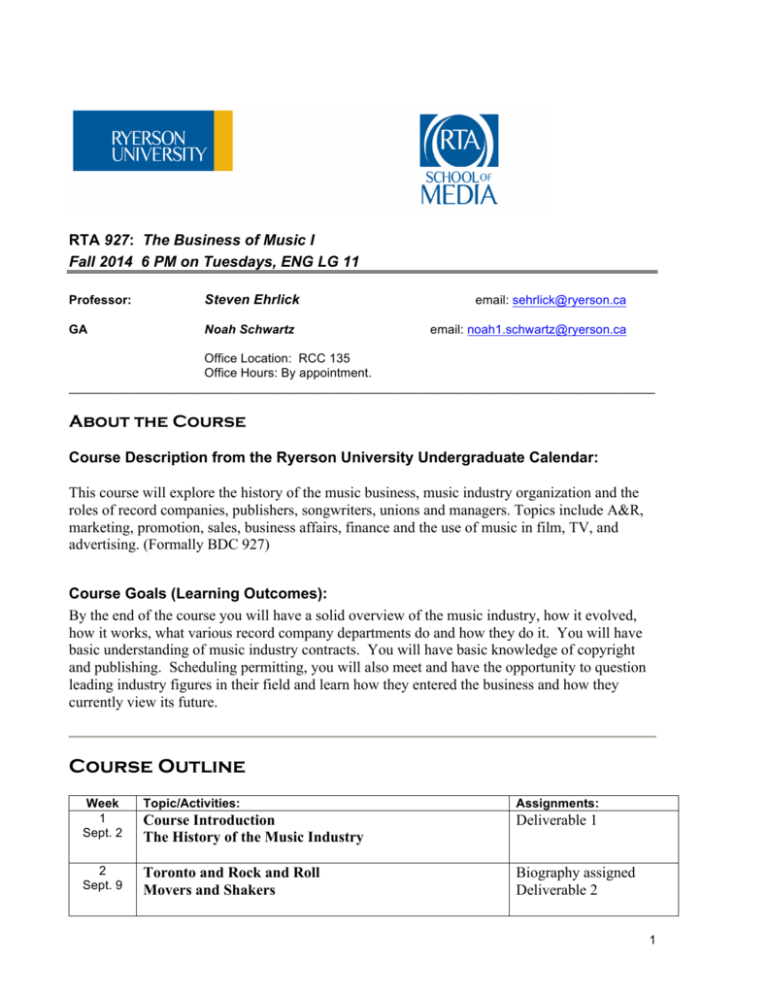
RTA 927: The Business of Music I Fall 2014 6 PM on Tuesdays, ENG LG 11 Professor: Steven Ehrlick GA Noah Schwartz email: sehrlick@ryerson.ca email: noah1.schwartz@ryerson.ca Office Location: RCC 135 Office Hours: By appointment. ____________________________________________________________________________________ About the Course Course Description from the Ryerson University Undergraduate Calendar: This course will explore the history of the music business, music industry organization and the roles of record companies, publishers, songwriters, unions and managers. Topics include A&R, marketing, promotion, sales, business affairs, finance and the use of music in film, TV, and advertising. (Formally BDC 927) Course Goals (Learning Outcomes): By the end of the course you will have a solid overview of the music industry, how it evolved, how it works, what various record company departments do and how they do it. You will have basic understanding of music industry contracts. You will have basic knowledge of copyright and publishing. Scheduling permitting, you will also meet and have the opportunity to question leading industry figures in their field and learn how they entered the business and how they currently view its future. Course Outline Week 1 Sept. 2 Topic/Activities: Assignments: Course Introduction The History of the Music Industry Deliverable 1 2 Sept. 9 Toronto and Rock and Roll Movers and Shakers Biography assigned Deliverable 2 1 3 Sept. 16 DIY – the new music industry The studio - How Songs become masters The A&R function Music Industry Contracts: The Recording Agreement DIY Marketing Plan assigned Music Industry Contracts, cont’d Deliverable 5 Oct. 7 Artist Representation DIY Proposal Due Deliverable 6 6 Oct. 14 Reading Week 7 Oct. 21 Marketing, Publicity, Promotion and Sales In-class workshop Deliverable 7 8 Oct. 28 The law of Copyright Music Publishing Deliverable 8 9 Nov. 4 Music Publishing (cont’d) DIY Marketing Plan Due by class commencement 4 Sept. 23 5 Sept. 30 Deliverable 3 Due: Bio Deliverable 4 Deliverable 9 10 Nov. 11 The Use of Music in Film, TV and Advertising Quiz Deliverable 10 11 Nov. 18 Independent Music in Canada: Arts & Crafts Case Study workshop 12 Nov. 25 A LOOK BACK REVIEW Evaluation Further details will be provided in class. Due dates are listed above. 1. 2. 3. 4. 5. Industry Biography------------------------------10% Quiz------------------------------------------------10% Deliverables X 10--------------------------------20% DIY Marketing Plan-----------------------------30% Exam-----------------------------------------------30% The exam and quiz may consist of short answer and multiple choice/true false type questions. You may be required to make calculations with a calculator. The DIY Marketing Plan will consist of social media/Internet marketing plan for a real artist. This is a group marked assignment plus a peer review component which will be filled out by each group member and utilized in the assessment of each individual’s grade for the group project. 2 In-Class Deliverables. You will be divided into groups of 6 (or 5) during the first class. This is your group for the term. Your group will not only be responsible for the creation of the DIY Marketing Plan, but each week you will be required to complete and deliver an in-class workshop assignment to your designated advisor. Please bookmark the class Google Doc at http://goo.gl/Cy9gxw. You must enter Google Doc using your Ryerson email address. Each in-class assignment will have a value of 2% of your total grade. Most can be completed in class but can be delivered via email by midnight of the same day. Only students present in class will be awarded these grades and groups shall only include the names of group members present on a particular day. Please follow #rta927 on Twitter. Feel free to send tweets during class with class questions, music industry questions. Alert the class to band gigs and events, or questions/issues related to the music industry. This is a deadline business. Assignments must be handed in on time. Grades for late assignments will be reduced by 20% if they are received within one week of the assigned due date. After one week, the grade will be reduced by 40%. No exceptions. A grade of zero (0) will be assigned for work over two (2) weeks late. If you miss any in-class graded test or assignment there is no possibility for a make up, subject to a legitimate excuse. See below for criteria. According to the marking criteria of Ryerson, • A will be given for excellent work • B for good work • C for satisfactory work • D for marginal work • F for unsatisfactory work The mark of “A” is reserved for excellent work that is well above the class average, on time, and professionally presented. Written work should include a cover page (with your name, your student number, the title of the project, the date submitted, the professor’s name, the course name and code, and your section number), headings, page numbers, be printed on white paper using black ink with no “printer problems”, using 12 point Times New Roman font, one-inch margins on all sides, properly and securely bound (no paper clips); it should be well written with appropriate word choices and very few spelling/punctuation/grammatical mistakes. If any of these elements are missing, you will not receive an “A”. Resources Required Reading: All You Need to Know About the Music Business Canadian Edition Donald S. Passman with Chip Sutherland. Simon & Schuster; Canadian Export edition (Nov. 5 2013). ISBN-13: 978-1451635546 (“Textbook”). Any edition is a good edition! Lefsetz Letter – free online subscription – www.lefsetz.com/lists/?p=subscribe&id=1 3 Optional Reading: Hit Men (optional), Fredric Dannen, Vintage Books, Random House 1990, 1991 ISBN: 0-67973061-3 (available online) Readings: All readings are to be completed prior to the beginning of class for the week. Textbook: Week 1,2 – Chapter 7 Week 4 – Chapters 8, 9 and 10 Week 5 – Chapters 11, 12 and 13 Week 7 – Chapters 2, 3, 6 Week 9 – Chapters 27, 29 Week 10 – Chapters 15, 16, 17 and 18 I will use Blackboard to post documents, as well as website links to reading materials. I will have as many music industry speakers as schedules will permit. The course will be taught mainly by way of lectures and workshops. Miscellaneous Information Missed Tests and in-class Evaluated Assignments: Tests and in-class evaluated participation and/or presentations, as applicable, cannot be made up, unless a student has valid medical documentation or bereavement exception for missing class. “Valid medical documentation” means a physician’s note indicating that the student was physically unable to write the test on the specific test date. If there is a family medical emergency, and you are required to attend at the emergency room with a parent, sibling, or grandparent, you must obtain a note from the treating physician indicating the date, the relationship between the student and the patient, and that you were with the patient in the emergency room on the test day. In the event of a funeral, on the day of a test or in-class evaluated assignment, for an immediate family member a student may request an alternate evaluation method based on compassionate grounds. With such valid medical documentation, or on compassionate grounds, at the sole discretion of the instructor, a written assignment may be substituted for the test or in-class evaluated assignment. Classroom Expectations: Courteous behaviour is expected in class at all times. If you are disruptive in class, you will be required to leave. Please put cell phones on vibrate prior to the beginning of each class. Laptops should be used for in-class work only. You will be treated professionally; the instructor expects the same in return. LAPTOPS MUST BE SHUT DURING GUEST LECTURES. Contacting Me: : If you need to discuss a matter with me, your first step should be to send me an email. If a personal meeting is required, an appointment may be made. If an emailed question requires a lengthy response, I will not respond to the question by email, but will instead ask you to see me in person. 4 Appendix (General information for all RTA students) Student Codes of Conduct All students are required to adhere to all relevant University policies, such as the Student Code of NonAcademic Conduct (see http://www.ryerson.ca/content/dam/senate/policies/pol61.pdf ) and the Student Code of Academic Conduct (see http://www.ryerson.ca/content/dam/senate/policies/pol60.pdf ). The Ryerson University Undergraduate Course Calendar This is your resource for all information relating to academics, including curriculum, course descriptions, significant dates (including last date to drop a course without academic penalty), academic standings, The Student Code of Academic & Non-Academic Conduct, etc. The Ryerson University Undergraduate Course Calendar is available online at http://www.ryerson.ca/undergraduate/calendars/. RTA Website At www.ryersonrta.com you will find information about the curriculum, course outlines, scholarships, student groups, staff & faculty, studios & facilities, etc. Blackboard Course Website Blackboard is an online course tool which may include an online discussion board, course documents such as the syllabus and lecture notes, announcements, an area where your grades are posted, etc. If your professor has set up a Blackboard site for this course, you’ll find it at http://my.ryerson.ca. RTA Online RTA Online is an Organization on Blackboard that contains templates for storyboards, production paperwork, etc., as well as online tutorials for software and equipment used in classes and labs. Find it under ‘Organizations’ on your my.ryerson.ca homepage. Your Ryerson Email Account: The RTA School of Media will often send you important information by email (e.g. scholarship information, reminders of important dates, notification of meetings and/or events, internship opportunities and job postings, etc.). Correspondence from RTA and from your professors will be sent ONLY to your Ryerson email account. It is your obligation to ensure that you activate your account and check it regularly, or have it forwarded to an account you check regularly. Please use only your Ryerson account for sending emails to staff & faculty. See below for accessing your Ryerson email account. Activating Your Ryerson Online Identity To access many of Ryerson's online resources, you must first activate your Ryerson online identity by completing a series of web forms available via http://www.ryerson.ca/accounts/. During the activation process, you will obtain a username and create your initial password. Once activated, your Ryerson online identity provides you with access to: Google Apps Ryerson email The Central Computer Labs including the Library and KHW71 The my.ryerson portal and learning system RAMSS (via https://my.ryerson.ca) Other servers and applications needed Notice to Students with Disabilities: Students with any disability (e.g. learning, medical, physical, sensory), illness, or condition that requires academic adaptations should discuss the situation with the professor and/or contact the Access Centre (http://www.ryerson.ca/accesscentre). 5 Written Assignments: All written assignments are expected to be properly formatted and cited using MLA style (unless otherwise indicated by your professor). Guides and references for using MLA style can be found through the Ryerson University Library as well as the Writing Centre. See http://writingcentre.blog.ryerson.ca/files/2012/05/MLA.pdf Fact-Based Media Assignments For assignments or projects in which real people and/or real events are to be featured (e.g. news stories, features, documentaries, interviews, etc.), students are expected to adhere to the highest standard of truth in reporting: all information included should be checked for accuracy and any guests/interviews/sound clips/etc. used must be real. Fabricating interviews or information, or using actors/friends to pose as someone they are not, etc. for the sake of an assignment are serious transgressions of media ethics and will not be tolerated. English as a Second Language: Ryerson University offers support to students who may require improvement in their overall English language communication skills. Please visit English Language Support at www.ryerson.ca/studentservices/els/ Accommodation of Student Religious Observance: At the start of the term, students who have religious observance obligations which will lead to absences from campus or academic activities during the semester should download the “Student Declaration of Religious Observance” form from http://www.ryerson.ca/senate/forms/relobservforminstr.pdf. Present a copy of the form to the professor within the first two weeks of classes. The professor and student will then consult to reach an agreement on a reasonable means to address the situation. Learning Success Learning Success (http://www.ryerson.ca/learningsuccess) helps students make the transition to university learning, develop sound learning strategies through tutoring options and course-based study groups, and achieve their academic potential by providing services in both traditional and virtual learning environments. Learning Success offers free workshops for students such as: Note-taking, Managing Tasks and Time, Ways of Learning, Critical Reading, Test Preparation and Test Anxiety, etc. Plagiarism: Plagiarism is defined by the University as “claiming the words, ideas, artistry, drawings, images or data of another person as if they were your own.” (Student Code of Academic Conduct, Ryerson University, 2006, p. 2). According to the Code, plagiarism includes: i. copying another person’s work (including information found on the Internet and unpublished materials) without appropriate referencing; ii. presenting someone else’s work, opinions or theories as if they are your own; iii. presenting another’s substantial compositional changes to an assignment as your own; iv. working collaboratively without permission of the instructor on an assignment, and then submitting it as if it was created solely by you; or v. submitting the same work, for credit, in two or more courses without the prior written permission of the instructor(s). (Student Code of Academic Conduct, Ryerson University, 2006, p. 2.) Usually one associates plagiarism with written works but it can include any work such as photographs/artwork, Internet materials, video, audio, and digital media. The University penalties for plagiarism can be severe, ranging from getting zero on the assignment up to, in cases of prior academic dishonesty, suspension or expulsion. Please note that you may be required to submit some or all of your written assignments to www.turnitin.com. Students who do not want their work submitted to this plagiarism detection service must, by the end of the second week of class, consult with the instructor to make alternate arrangements. Useful links to help you understand and avoid plagiarism: Ryerson’s Academic Integrity web site: http://www.ryerson.ca/academicintegrity/ Student Code of Academic Conduct policy: http://www.ryerson.ca/senate/policies/pol60.pdf 6 Cheating: Cheating is defined by Ryerson University as: i. using materials or aids not expressly allowed by the instructor in an examination or test; ii. copying another person’s answer(s) to an examination or test question; copying another person’s answers to individually assigned projects; iii. consulting with another person or unauthorized materials outside of an examination room during the examination period (e.g. discussing an exam or consulting materials during an emergency evacuation or when permitted to use a washroom); iv. improperly submitting an answer to a test or examination question completed, in whole or part, outside the examination room unless specifically permitted by the examination format; v. resubmitting altered test or examination work after it has already been evaluated; vi. presenting falsified or fabricated material, including research results; or vii. improperly obtaining, through deceit, theft, bribery, collusion or otherwise, access to examination paper(s) or set of questions, or other confidential information. (Student Code of Academic Conduct, Ryerson University, 2006, p. 2) The University penalties for cheating can be severe, ranging from getting zero on the assignment or test up to, in cases of prior academic dishonesty, suspension or expulsion. Use of Laptops, Cell Phones, and Other Mobile Electronic Devices in the Classroom Students are advised that because various learning & teaching activities may be enhanced or diminished by use of mobile devices, it is up to each professor to determine when & how such devices can or should be used by students during any given class. Students may not take pictures, video recordings, or sound recordings in class without express permission from the professor. RTA Policy on Offensive Materials RTA School of Media desires to foster an environment that promotes and embraces the principles of freedom of expression, academic inquiry, and creativity. Within this context we all have a responsibility to respect the rights and freedoms of others, including the right to study and work in an environment which is free of offensive materials. The term offensive may be used to refer to material that: - is overtly sexual, and/or - contains profanity, and/or - perpetuates stereotypes (e.g. racial, gender, sexual, religious, etc.), and/or - depicts violence, and/or - denigrates members of marginalized groups based on various factors such as sexual orientation, race, ethnicity, class, gender, disability, etc. Should you not be sure if your content is offensive, please follow up with your instructor before proceeding with your project. Please review the full policy which can be found in the RTA Student Handbook on our website: www.ryersonrta.com 7
